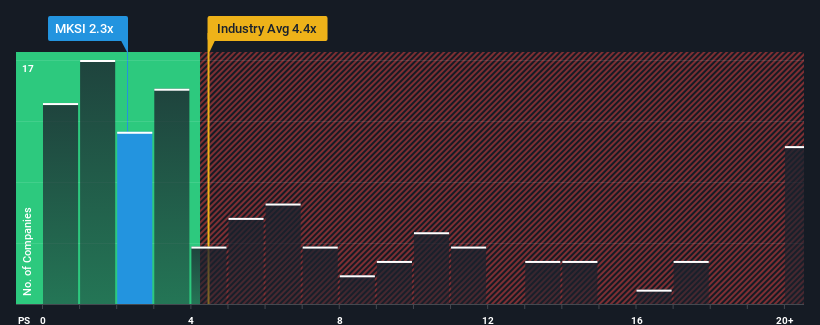- United States
- /
- Semiconductors
- /
- NasdaqGS:MKSI
Investors Aren't Buying MKS Instruments, Inc.'s (NASDAQ:MKSI) Revenues

MKS Instruments, Inc.'s (NASDAQ:MKSI) price-to-sales (or "P/S") ratio of 2.3x might make it look like a buy right now compared to the Semiconductor industry in the United States, where around half of the companies have P/S ratios above 4.4x and even P/S above 11x are quite common. Although, it's not wise to just take the P/S at face value as there may be an explanation why it's limited.
View our latest analysis for MKS Instruments

What Does MKS Instruments' P/S Mean For Shareholders?
MKS Instruments could be doing better as it's been growing revenue less than most other companies lately. The P/S ratio is probably low because investors think this lacklustre revenue performance isn't going to get any better. If you still like the company, you'd be hoping revenue doesn't get any worse and that you could pick up some stock while it's out of favour.
Keen to find out how analysts think MKS Instruments' future stacks up against the industry? In that case, our free report is a great place to start.What Are Revenue Growth Metrics Telling Us About The Low P/S?
The only time you'd be truly comfortable seeing a P/S as low as MKS Instruments' is when the company's growth is on track to lag the industry.
Retrospectively, the last year delivered a decent 2.7% gain to the company's revenues. This was backed up an excellent period prior to see revenue up by 49% in total over the last three years. So we can start by confirming that the company has done a great job of growing revenues over that time.
Shifting to the future, estimates from the eight analysts covering the company suggest revenue should grow by 5.1% each year over the next three years. That's shaping up to be materially lower than the 27% each year growth forecast for the broader industry.
In light of this, it's understandable that MKS Instruments' P/S sits below the majority of other companies. Apparently many shareholders weren't comfortable holding on while the company is potentially eyeing a less prosperous future.
What Does MKS Instruments' P/S Mean For Investors?
We'd say the price-to-sales ratio's power isn't primarily as a valuation instrument but rather to gauge current investor sentiment and future expectations.
As expected, our analysis of MKS Instruments' analyst forecasts confirms that the company's underwhelming revenue outlook is a major contributor to its low P/S. At this stage investors feel the potential for an improvement in revenue isn't great enough to justify a higher P/S ratio. Unless these conditions improve, they will continue to form a barrier for the share price around these levels.
It's always necessary to consider the ever-present spectre of investment risk. We've identified 1 warning sign with MKS Instruments, and understanding should be part of your investment process.
If these risks are making you reconsider your opinion on MKS Instruments, explore our interactive list of high quality stocks to get an idea of what else is out there.
New: Manage All Your Stock Portfolios in One Place
We've created the ultimate portfolio companion for stock investors, and it's free.
• Connect an unlimited number of Portfolios and see your total in one currency
• Be alerted to new Warning Signs or Risks via email or mobile
• Track the Fair Value of your stocks
Have feedback on this article? Concerned about the content? Get in touch with us directly. Alternatively, email editorial-team (at) simplywallst.com.
This article by Simply Wall St is general in nature. We provide commentary based on historical data and analyst forecasts only using an unbiased methodology and our articles are not intended to be financial advice. It does not constitute a recommendation to buy or sell any stock, and does not take account of your objectives, or your financial situation. We aim to bring you long-term focused analysis driven by fundamental data. Note that our analysis may not factor in the latest price-sensitive company announcements or qualitative material. Simply Wall St has no position in any stocks mentioned.
Have feedback on this article? Concerned about the content? Get in touch with us directly. Alternatively, email editorial-team@simplywallst.com
About NasdaqGS:MKSI
MKS
Provides foundational technology solutions to semiconductor manufacturing, electronics and packaging, and specialty industrial applications in the United States, China, South Korea, Japan, Taiwan, Singapore, and internationally.
Good value average dividend payer.
Similar Companies
Market Insights
Community Narratives




